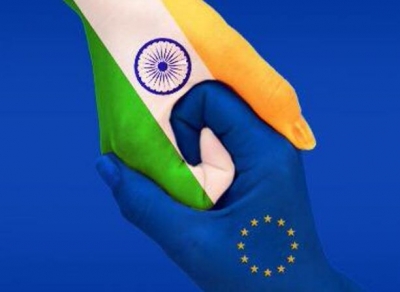New Delhi: The European Union is awaiting India’s response to its proposal for setting up a dedicated dispute settlement mechanism under the bilateral investment protection pact that is being negotiated along with an ambitious free trade agreement (FTA) by the two sides, a top EU official said Saturday.
The EU’s Executive Vice-President and Commissioner for Trade Valdis Dombrovskis told a select group of journalists that both sides are engaged in “intensive” negotiations on the proposed FTA and that “progress” has been made on various issues.
But at the same time the top EU official, currently on a visit to India, noted that there is “still a lot of work ahead of us.”
Asked when the FTA can be sealed, the EU Commissioner for Trade said the main focus has been on “substance over deadlines”.
“The free trade agreement will give India preferential access to the EU market, which is the largest single market in the world,” Dombrovskis said.
To a question, Dombrovskis said there is no direct impact of New Delhi’s trade ties with Moscow on the India-EU trade negotiations, adding: “In a sense, we do not see new topics emerging which could be obstacles for the FTA in this context.”
Dombrovskis also allayed New Delhi’s concerns over its proposed carbon tax on imports of high-carbon goods like steel and iron ore and described it as a “non-discriminatory” measure aimed at protecting the planet.
Over four months back, the European Union announced its decision to impose a carbon tax on imports of steel, aluminium, cement, fertilisers and electricity as part of its Carbon Border Adjustment Mechanism (CBAM).
The CBAM that will come into effect from 2026 is aimed at achieving net zero greenhouse emissions by 2050.
“Given that the CBAM is non-discriminatory and non-trade distorted, it doesn’t really affect certain countries’ producers’ ability to export to the EU. And EU producers will be paying the same price. So there’s not going to be trade distorting effects,” Dombrovskis said.
On the dispute settlement mechanism proposed by the EU for its investment protection agreement with India, Dombrovskis said it had similar mechanisms in all such pacts that the 27-nation grouping firmed up in recent times.
The EU has proposed setting up an independent investment court system as part of the dispute settlement mechanism under the investment protection pact.
“We have proposed this investment court system, as we have had in all recent agreements which we have concluded. Currently, we are also waiting for India’s offer in this regard,” Dombrovskis said.
“And we’ll be following it up in the next negotiating round. In any case, I would say that from both sides, there is a willingness to explore different avenues and find a solution of how this dispute settlement mechanism could work,” he said.
Asked about India’s unwillingness to have such a mechanism as any dispute could be resolved by the World Trade Organisation’s dispute redressal mechanism, Dombrovskis suggested that it is better to have a bilateral solution than going to the global body.
“When we discuss bilateral engagements — that’s the whole purpose of having bilateral free trade agreements, having bilateral investment protection agreements that go beyond what is in WTO,” he said.
When asked about reports of some EU countries pushing for incorporating certain clauses relating to rights and environmental issues in the FTA, Dombrovskis said it’s only well-established practice in the EU agreements and they are part of “what we call trade and sustainable development chapters.”
These chapters cover human rights and especially labour rights and environmental questions, he added.
The trade commissioner said there is a strong demand for it from a number of EU member states as well as from the European Parliament and broader civil society with an aim to ensure that EU trade is not leading to environmental degradation or deteriorating labour standards or other negative consequences.
The EU trade commissioner also highlighted the importance of the proposed investment protection agreement between the EU and India.
“It will help to attract more European investment to India, providing investors with necessary reassurances and help to meet India’s ambition of becoming a global manufacturing hub,” he said.
“The free trade agreement will give India preferential access to the EU market, which is the largest single market in the world, and thus will facilitate economic development and the geographical indication,” he added.
On EU’s trade ties with India, the Trade Commissioner said the grouping is looking at significantly expanding economic engagement with New Delhi.
“The EU is India’s second-largest trading partner, accounting for some 120 billion euros worth of trading last year, which is 10.8 per cent of total Indian trade.
“And India is the EU’s 10th largest trading partner, accounting for two per cent of EU total trade. But at the same time, we see that there is still lots of untapped potential,” he said.
Dombrovskis said the EU is looking at making sure that its trade and investment cooperation with India becomes “much more intense”.
PTI
